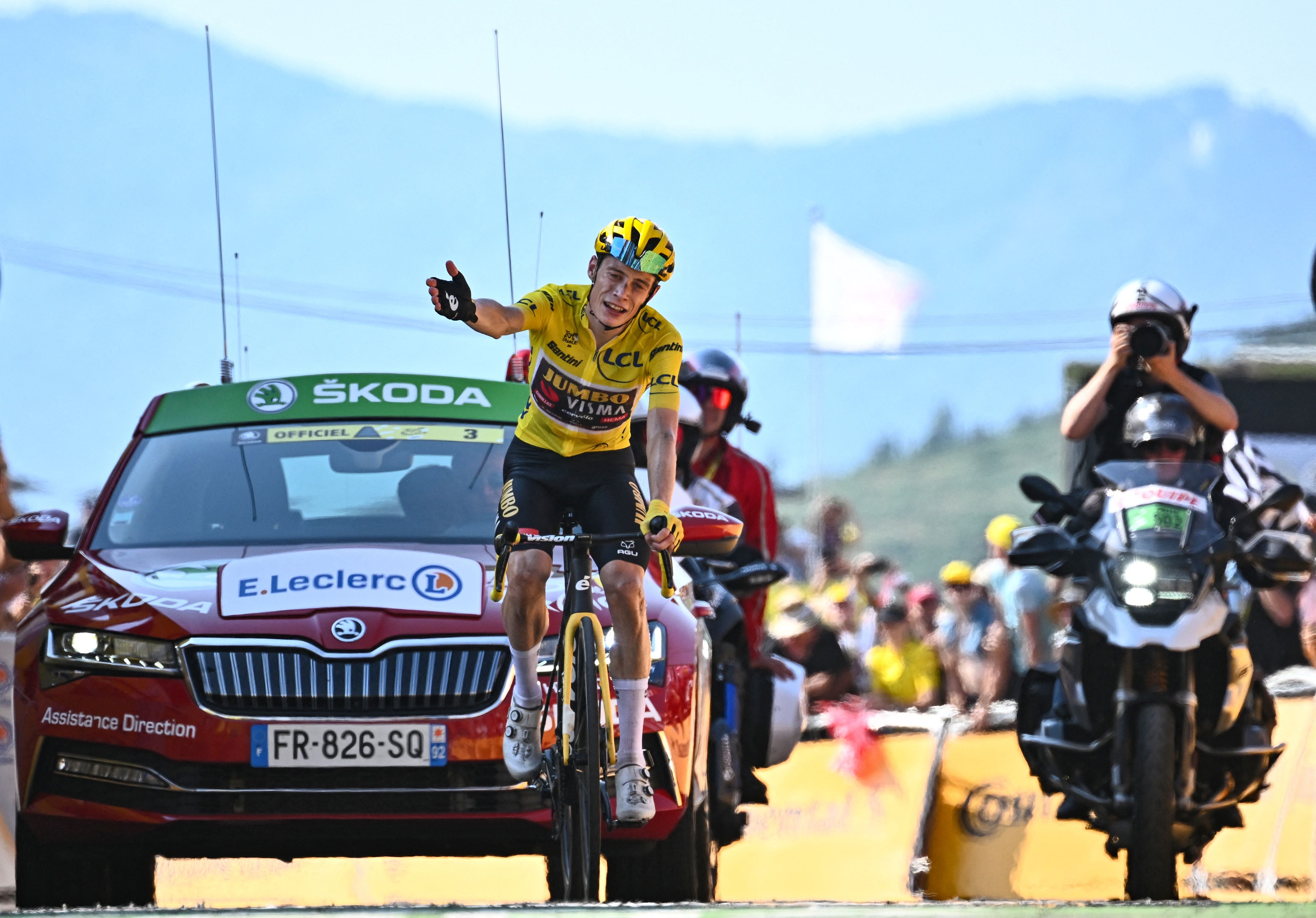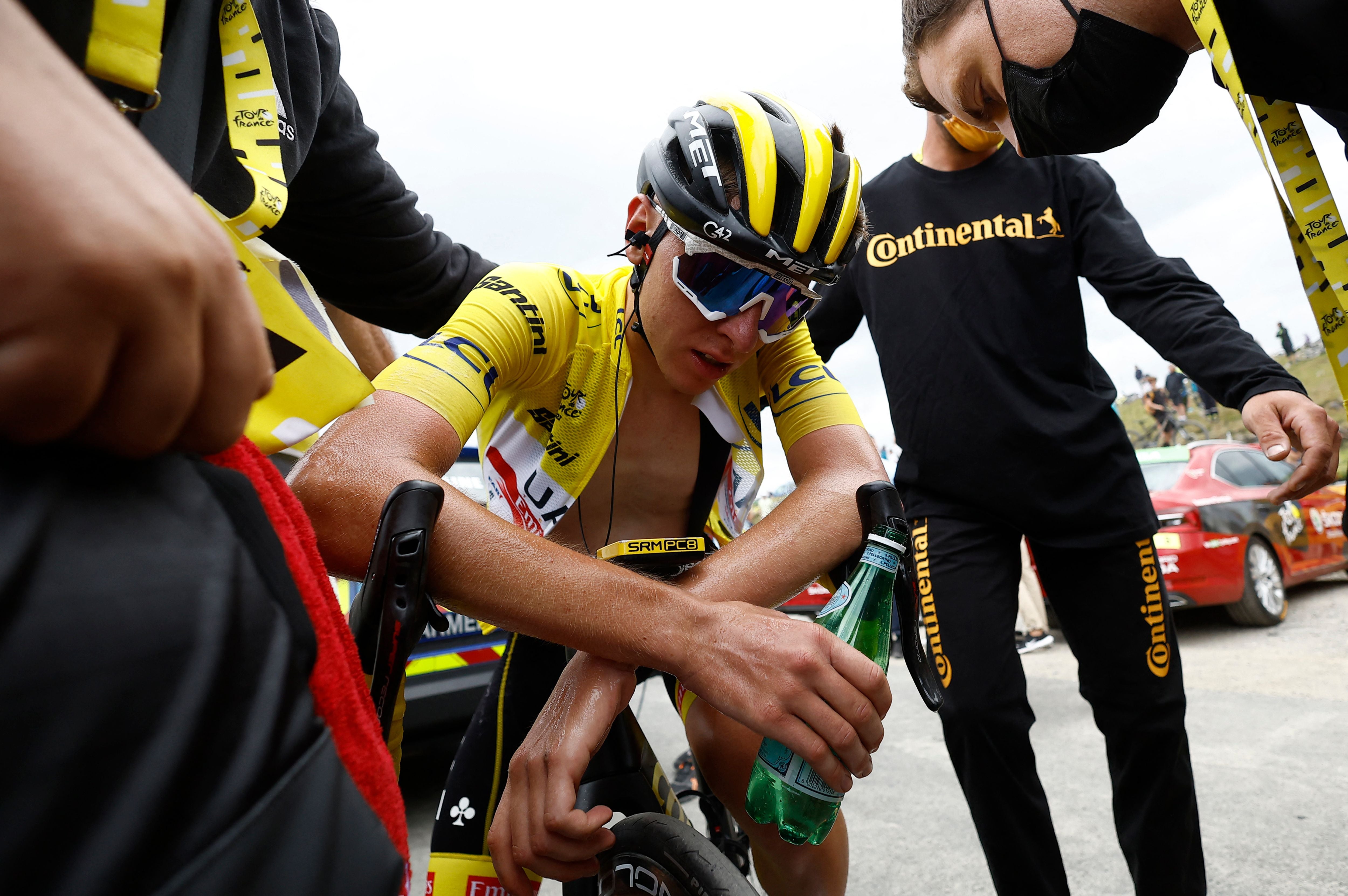How Jonas Vingegaard and Jumbo-Visma broke Tadej Pogacar’s stranglehold on the Tour de France
Vingegaard’s strength and resilience ultimately won the Tour, but his triumph also required an aggressive team ploy ruthlessly executed to make reigning champion Pogacar wilt

One of the beauties of the Tour de France is the myriad ways in which it can be won. Sometimes a rider bullies from start to finish, like Bernard Hinault, who intimidated rivals with his presence and crushed them at every opportunity en route to Paris in 1981. Time-trial specialists mark rivals on the climbs and hurt them on the clock, as Miguel Indurain did so emphatically in 1992, and again in 1994. Chris Froome used Team Sky’s stranglehold on the peloton to suffocate his opponents, while Tadej Pogacar’s back-to-back wins in 2020 and 2021 displayed his individual, unpredictable brilliance.
Jonas Vingegaard is the latest man to win the Tour, and for all his unerring strength and resilience across these past three weeks, the race was won in a decisive hour in the Alps, when Jumbo-Visma’s team tactics isolated and outwitted Pogacar and stripped the yellow jersey from his back.
Head to head, there has not been much to choose between the two leading protagonists of this year’s compelling story. Both are capable time-triallists, both strong climbers, both clearly able to handle the unique pressures that come with leading a team in a grand tour. Pogacar had a slight burst of flat speed that helped him edge stages seven and 17, and the punchier legs that saw him surge to victory on stage 6, back when it seemed his race to lose. Vingegaard had the edge in the highest mountains, where he never cracked despite Pogacar’s best efforts.
But the decisive gap between them was forged on stage 11. On a baking hot day over three of the toughest Alpine climbs in this year’s race, Jumbo-Visma came with a gameplan to disrupt and destroy. The team set a hard pace on the front of the peloton that few could match, then began launching a pincer attack on Pogacar, as Vingegaard and Primoz Roglic took it in turns to surge forward and make him chase or risk losing touch.
That on its own might not have been enough to hurt Pogacar – who spent most of the day alone without the support of his Covid-depleted UAE Team Emirates – but crucially, and maybe foolishly, the reigning champion responded with some attacks of his own. Perhaps Pogacar underestimated Vingegaard, or perhaps he simply let pride take over, as he sped towards the final climb with the Dane in tow saving energy on his wheel, and he could not compete once they climbed to the upper reaches of the Col du Granon.
This is not to diminish Vingegaard’s victory. Attacking riding has come to define his early grand tour career and he was not going to pass up the opportunity to go for glory atop that last ascent. “I took the chance,” Vingegaard later explained. “I didn’t know if he was suffering, but they told me on the radio that it was steeper at five kilometres to go, and I was thinking: ‘Either they make it hard, or I try to attack.’ So that’s what I did.” He kicked on, and Pogacar could not respond. After two-and-a-half Tours of imperious strength, finally Jumbo-Visma had made the Slovenian prodigy crack.

Vingegaard still had to withstand huge pressure over the remaining stages of the Tour, particularly in the Pyrenees. With nothing to lose, Pogacar attacked with a randomness that was impossible to predict, forcing his rival to be concentrated throughout, ready to give chase with any given pedal stroke. That focus and stress takes an enormous psychological toll, but Vingegaard never missed a trick, and it was the Dane who had the legs to win on Hautacam on a decisive stage 18.
It has been a rapid rise for Vingegaard since joining Jumbo in 2019 as a reliable domestique. He was parachuted into team leadership unexpectedly during last year’s Tour as a result of Roglic’s early crash, and showed himself worthy of the role. But he still had little to call upon in the way of major race victories coming into this season, so the way he has transitioned from young challenger to consummate leader, winning La Drome Classic and finishing runner-up at the Dauphiné, has been extremely impressive.
For Jumbo-Visma, it has been a gradual progression to this day. Since its formation in 1984 as Kwantum-Decosol, the Dutch team has always been a classics specialist, collecting wins in races such as the Tour of Flanders and Amstel Gold. But since becoming Jumbo-Visma in 2019, the team has been the strongest challenger to Team Sky/Ineos’s stranglehold on the Tour de France, moving away from only targeting stages to targeting the yellow jersey itself. The team’s depth of talent is such that it finished on the podium in Paris three years in a row with three different riders, all the while developing a winning habit at the Vuelta a España through Roglic’s domination of the Spanish race.
This was a Tour when the strongest rider won. But it was also a race that required precise, ruthless strategy to give him a platform to take control. Had Jumbo-Visma not thrown every possible weapon at stage 11, perhaps Pogacar would not have cracked, or shown vulnerability, or ever given up the yellow jersey. There might not have been another moment when the stars aligned to inflict such significant damage. After two years of domination, Jumbo-Visma recognised that strength in numbers would be crucial to breaking Pogacar’s hold. Their plan was precise, its execution ruthless, and finally it is their rider on cycling’s top step.
Join our commenting forum
Join thought-provoking conversations, follow other Independent readers and see their replies
Comments
Bookmark popover
Removed from bookmarks